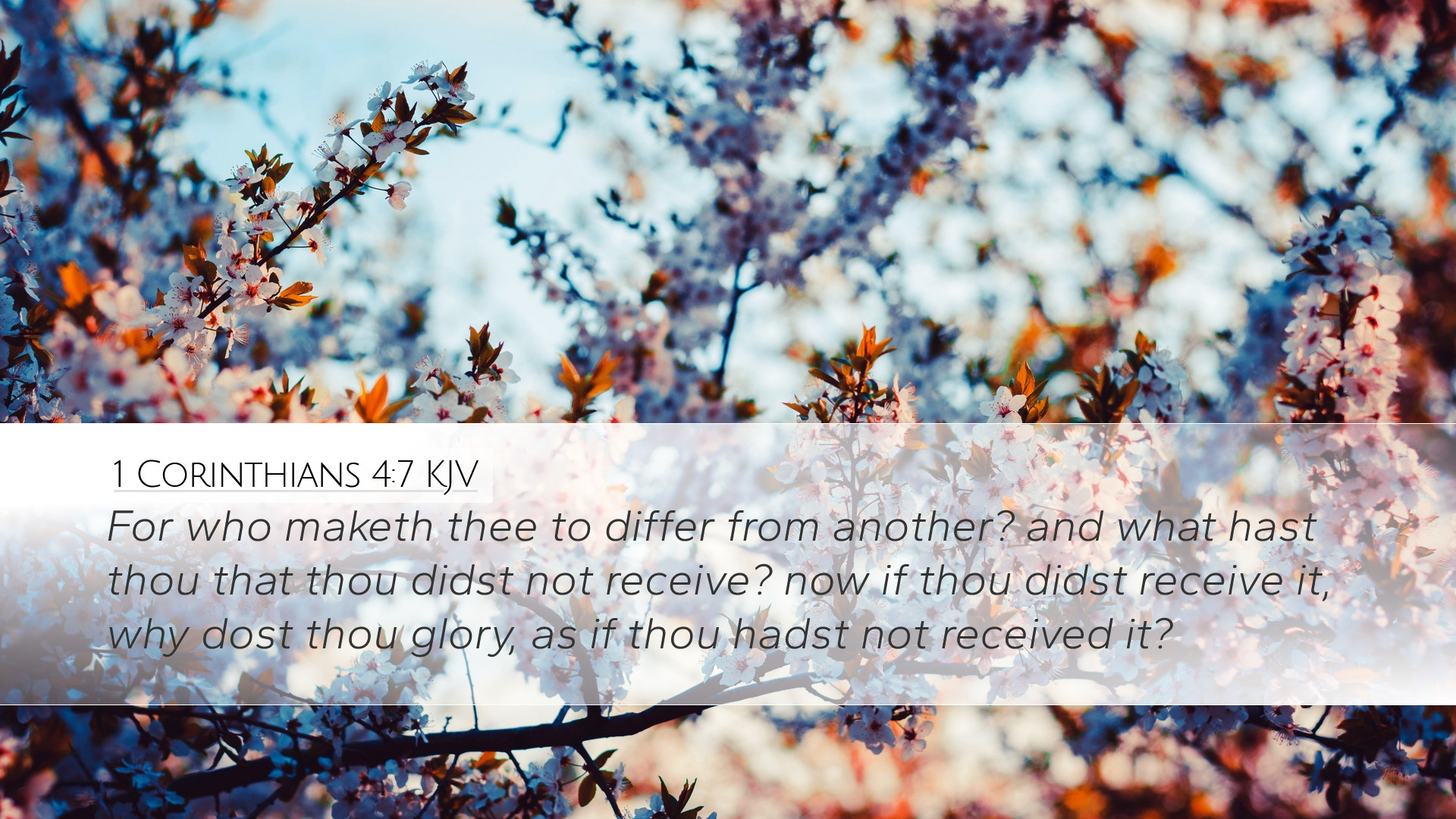1 Corinthians 4:7 Commentary
"For who makes you differ from another? And what do you have that you did not receive?" (1 Corinthians 4:7, NKJV)
Introduction
The Apostle Paul, in his first Epistle to the Corinthians, addresses issues of pride, division, and the understanding of spiritual gifts. In 1 Corinthians 4:7, Paul presents a rhetorical question that invites introspection and humility among believers. To fully grasp the depth of this verse, let’s examine the insights gleaned from various public domain commentaries, providing a comprehensive understanding for pastors, students, theologians, and scholars alike.
Contextual Background
To appreciate the significance of this verse, it is essential to consider its context within the letter. The Corinthian church was experiencing divisions and contentions over leadership and spiritual gifts. Paul emphasizes the nature of true ministry and the source of every believer’s gifts and abilities.
Matthew Henry remarks that this passage is aimed at countering the inflated egos of those who exalt themselves due to their spiritual gifts or leadership roles. Paul’s response encourages the church to remember that their very abilities are gifts from God.
Who Makes You Differ?
Paul begins with the question, “For who makes you differ from another?”. This inquiry challenges the Corinthians to reflect on the source of their distinctions and abilities. Albert Barnes emphasizes that differences in spiritual gifts among believers should not lead to pride or division since these gifts are sovereignly bestowed by God.
This serves as a reminder that no one has a right to boast about their spiritual stature or position, as each member of the body of Christ is equally essential and equally dependent on God’s grace.
What Do You Have That You Did Not Receive?
The second part of the verse, “And what do you have that you did not receive?” underscores a profound theological truth about grace. Adam Clarke states that this verse illustrates the idea that all Christians receive their grace and talents directly from God, who is the ultimate giver of every good gift.
This realization should foster a spirit of humility and gratitude, displacing any temptation toward pride. Understanding that our strengths and abilities are extensions of God’s grace should motivate believers to serve with gratefulness rather than self-sufficiency.
Theological Reflections
1 Corinthians 4:7 has broad implications for a theology of grace, leadership, and community. It invites believers to appreciate the collaborative nature of the church and acknowledges that diversity in gifts enhances the body of Christ rather than creates hierarchies.
- Humility in Leadership: Leaders are called to demonstrate servitude (Mark 10:43-45), led not by a sense of superiority but by a recognition of their dependency on God.
- Unity in Diversity: Paul’s admonition encourages communal support and elevation of fellow believers, acknowledging that contributions stem from God’s generosity rather than individual merit.
- Gratitude and Responsibility: Understanding that abilities are received from God leads to responsible stewardship of those gifts—it is a call to action to use them for God’s glory.
Practical Application
For pastors and church leaders, this verse serves as a foundational principle for leading the congregation with humility and grace. Encouraging others to recognize their gifts as divine entrustments can foster a healthy church culture focused on collaboration and mutual respect.
Students and theologians are prompted to engage with these insights critically, reflecting on their understanding of grace and recognizing the significance of community in the expression of faith.
Furthermore, every believer is called to an attitude of thankfulness and service, using their God-given gifts not for self-aggrandizement but to build up the body of Christ, aligning with the heart of Paul’s message in this epistle.
Conclusion
In examining 1 Corinthians 4:7, we are invited to cultivate a spirit of humility, acknowledging that our differences and abilities are rooted in divine providence. As we reflect on the richness of Paul’s message, may we be inspired to serve one another and the Lord with the gifts we have received, maintaining the unity of the faith and working towards the common good of the body of Christ.


